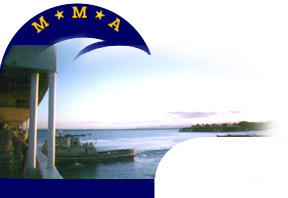
Captain's Log for Wednesday 12 January 2000
|
Half-way across the pond! At 1200 EST the T/S Empire State was enroute to Funchal, Madeira and located at 33 degrees and 59 minutes North Latitude and 43 degrees, 20 minutes West Longitude. She was steering course 094 degrees true, at a speed of 16.8 knots. The weather continues to be absolutely gorgeous. The skies were partly cloudy with very light winds out of the southwest at 2 knots. Barometric pressure remained steady at 1022 millibars of mercury. The air temperature was 66 degrees and seawater was 65 degrees. Seas were 3 to 6 feet and the depth of water beneath the keel was 2800 fathoms. CAPTAIN'S LOG 12 JANUARY 2000 The cadets have settled into the sea routine and are beginning to comprehend the underway organization quite well. They are divided into three divisions; each division is deeply involved in different aspects of the Sea Term. Today, Division One is the underway watch division. That means they are on station 24 hours a day (standing 4-hour shifts) as they steer the ship, turn the prop, make the fresh water, and navigate. Division Two is the training division. No different than a classroom in an ordinary college - except this classroom is moving! Training involves lectures, homework, midterms and final exams while the cadet earns 6 academic credits. Division Three is the maintenance division. Put 13,304 tons of steel in salt water, add 570 men and women working day and night, and there is ALWAYS maintenance to do. Every 6 days, the division assignments change, giving every cadet a variety of experiences. As one might expect, the cadets have already begun to compete among the divisions and between the majors. They tend to turn everything into a friendly rivalry. They play foosball, Ping-Pong, and basketball like someone's life depended on it. Games of chess and Cribbage can be seen whenever they have some time. The cadets will even argue about whom has the worst job - although I think the scullery dogs who do the pots, pans, and dishes for the ship win that fight hands down. Cadets also boast about the relative importance of their selected major. "Navigation!" is most important say the Deckies. The Engineers counter: "Without our engines you wouldn't need to navigate!" The Marine Safety students verbally joust back: "When you two make a mistake, WE are the ones who have to clean up the mess." There may be no radio or TV out here in the middle of the Atlantic, but there is never a dull moment. What they don't know yet is that ALL of them are indispensable to the training and education operation. Every job, even the most menial, is critical in the closely linked life of a ship. It seems only I know that now. At the end of this Sea term, they will all realize it. What follows are comments from freshman cadet Melissa De Valles of Fairhaven, MA: A day in the life of 4/C Melissa DeValles on Sea Term 2000 "I barely know where to begin. In essence, one could say that it's a fairly big adjustment getting used to eating, showering, sleeping, and living with so many people on this small, swaying ship. I suppose that I was given fair warning about what to expect from "shipboard-life. Here at MMA, the upperclassmen very willingly provided "useful" lessons in an attempt to save us from learning what they learned the hard way. Since getting under way, I've spent two days on watch in the engine room. Let me say right off, the worst job ever created for a Youngie is watching the water level in the auxiliary condenser sight glass. Stare at that thing for 4 straight hours and you'll quickly begin to have deep internal conversations about how episodes of Scooby Doo and Bugs Bunny really influenced your life. Overall, I can't complain. I've learned a ton. There is something about crossing the Atlantic - whether historic, or exciting, or just frightening that keeps me interested and eager for the days events to come." QUESTIONS FOR 13 JANUARY 2000 GEOGRAPHY: The Cape Cod Canal is 32 feet deep. By contrast, where is the deepest point on the ocean floor and how many feet deep is it? SCIENCE: What chemical is principally responsible for making the ocean taste salty? HISTORY: The ship will sail against the Gulf Stream for the first leg of the voyage. Who was the first person to chart the Gulf Stream? MATH: If the ship moves 20 feet forward for each revolution of the propeller, how many revolutions per minute does the propeller turn to make the ship go 15 knots? ANSWERS FOR 12 JANUARY 2000 GEOGRAPHY: South Atlantic, North and South Pacific, Indian, Arctic, Antarctic. SCIENCE: The Red Sea is located between Egypt and Saudi Arabia. Frequent algae blooms color the surface water red. HISTORY: They would fall off the face of the earth. MATH: 900 feet.
|
|
|||||||||||||||||||||||||||||||||||||||||||||||||||||||||